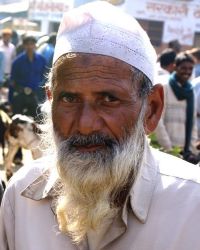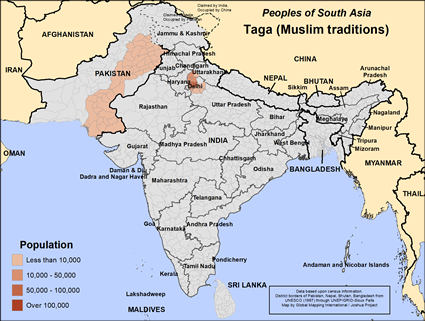Taga (Muslim traditions) in India

Photo Source:
Copyrighted © 2026
Isudas All rights reserved. Used with permission |

Map Source:
People Group data: Omid. Map geography: UNESCO / GMI. Map Design: Joshua Project.
|
| People Name: | Taga (Muslim traditions) |
| Country: | India |
| 10/40 Window: | Yes |
| Population: | 204,000 |
| World Population: | 225,000 |
| Primary Language: | Hindi |
| Primary Religion: | Islam |
| Christian Adherents: | 0.00 % |
| Evangelicals: | 0.00 % |
| Scripture: | Complete Bible |
| Ministry Resources: | Yes |
| Jesus Film: | Yes |
| Audio Recordings: | Yes |
| People Cluster: | South Asia Muslim - other |
| Affinity Bloc: | South Asian Peoples |
| Progress Level: |
|
Introduction / History
Farming is the main vocation of the Taga people, often referred to as the Tyagi people. Tyaga is often used as a surname. They have two sub-groups: Dasa (or Daswan) and Bisa (or Biswan).
What Are Their Lives Like?
The Dasa allow widows to re-marry but the Bisa forbid it. Marriages generally occur only within the Dasa and Bisa sub-groups. Each sub-group includes a number of clans, or gotras. When the father dies, family property is equally divided among sons. The Taga may have been Brahmins at one time but have lost their priestly status.
What Are Their Beliefs?
The Taga people are Sunni Muslims who believe that the supreme God, Allah, spoke through his prophet, Mohammed, and taught mankind how to live a righteous life through the Koran and the Hadith. To live a righteous life, you must utter the Shahada (a statement of faith), pray five times a day facing Mecca, fast from sunup to sundown during the month of Ramadan, give alms to the poor, and make a pilgrimage to Mecca if you have the means. Muslims are prohibited from drinking alcohol, eating pork, gambling, stealing, slandering and making idols. They gather for corporate prayer on Friday afternoons at a mosque, their place of worship.
The two main holidays for Sunni Muslims are Eid al Fitr, the breaking of the monthly fast and Eid al Adha, the celebration of Abraham's willingness to sacrifice his son to Allah.
Sunni religious practices are staid and simple. They believe that Allah has pre-determined our fates; they minimize free will.
In most of the Muslim world, people depend on the spirit world for their daily needs since they regard Allah as too distant. Allah may determine their eternal salvation, but the spirits determine how well we live in our daily lives. For that reason, they must appease the spirits. They often use charms and amulets to help them with spiritual forces.
What Are Their Needs?
Most of the Taga living in India live in Uttar Pradesh, the "home of Hinduism," though there are Muslims like the Taga people. This state has not given a home to the Christian gospel, however. Christians form only a tiny minority in this state. God will need to make a way in their hearts for the one who offers life to the full!
Prayer Points
Pray that indigenous evangelists and church planters working in Uttar Pradesh would be made aware of the Taga people. Pray the Lord would send some of these workers to the Taga. Pray for those who will soon come to Christ from this people group, that they would be devoted to one another in brotherly love, honoring one another above themselves, not lacking in spiritual fervor, serving the Lord joyfully. Pray the Lord would open the eyes of the Taga so they will see Jesus as he truly is, the only way to reconciliation with the living God.